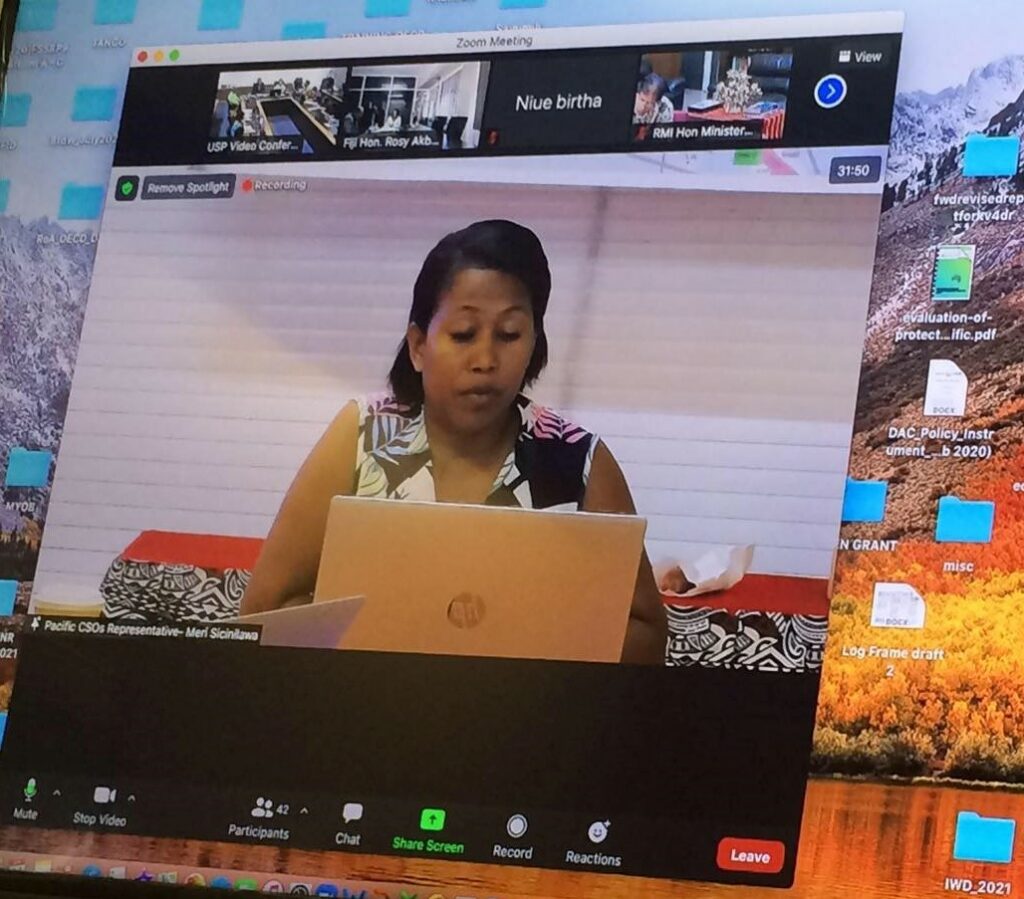Regional CSO’s tells Forum Education Ministers to prioritise funding for Education to build resilience and recover from Covid 19.

Civil Society Organisations (CSOs) in the Pacific are optimistic that concerted effort of all stakeholders at the regional, national and local levels will scale up effort to implement Pacific Regional Education Framework (PacREF), its stated alignment with SDG4, which is to ‘ensure inclusive and equitable quality education and promote lifelong learning opportunities for all’.
During the 12th Forum Education Ministers Meeting (FEdMM) today, regional CSO urged Education Ministers to lobby and ensure that national education budgets are protected and preferably increased at this crucial time.
The CSOs’ statement which was presented by Meri Lewavudi of the Council of Pacific Education (COPE) highlighted the need to build resilience and capacity in national education systems and infrastructure, as well as to implement a range of national and local education programs that are currently not sufficiently resourced.
“Education is a key vehicle for enabling countries to become resilient and to recover, and it needs to be prioritised for funding in COVID-19 recovery programs. Without further funding, many of the PacREF and SDG4 targets will not be met,” CSO stated.
The Regional CSO’s highlighted the need to better understand and overcome the barriers to education faced by women and girls in the Pacific and urged the Ministers to approve the Pacific Regional Inclusive Education Framework (PRIEF) as a guiding document to Pacific Education when supporting planning at national and regional levels, including through PacREF.
Regional CSOs also recommended inclusive education to ensure that priority be given to those who are missing out on and are being excluded from receiving good quality education, adding the most vulnerable and marginalised groups have the least resources to survive and recover which include rural and remote communities, people with disabilities, illiterate adults, out of school youth, and minorities such as LGBTQI groups children whose lives have been severely challenged by the impacts of climate change and natural disasters.
“We urge for renewed commitment to allocate resources to ensure there is no one left behind in education.,”
“Integrate physical education, physical activity and sport in school policies and practices as the periodic education policy and curricula reviews take place in each Pacific Island Country and Territory.
“If country-level support and technical assistance is needed, Member States should make requests to UNESCO and WHO for Quality Physical Education and Health Promoting Physical Activity respectively,” CSOs stated The CSOs also recommended the need to address the gaps in achieving SDG4 and PacREF by increasing provision and access to early childhood care and education, improving literacy and numeracy in primary and secondary education, inclusive curriculum with a holistic approach that is
grounded in culture, language, identity and safeguarding of our natural resources, improving national education data collection and culturally and contextually relevant use of education
technologies.
They also recommended the need for community learning opportunities for youth, adults and the elderly, further and special training and professional development for teachers to ensure that teachers are treated as professionals, teaching of Pacific literacies, environmental education, climate justice and critical thinking skills, to invest in next generation leadership capacity enhancement with required consistent support and commitment.
While this opportunity to engage with the Forum Education Ministers at their FEdMM meeting is very welcome, greater CSO participation and engagement in education policy and programs should be considered.
The Regional CSO’s wish to remind the Pacific Leaders of the Rights to education for all Pacific children as a fundamental tool for self – community and national development.
“CSO’s need to be resourced and supported and play their ongoing role in regional and national education policy and program development which includes ensuring strong CSO participation in national education policy consultation and implementation – ensuring it is inclusive to includes all Pacific countries across the Oceania.
They are committed to strengthened education policy and we thank the Forum Education Ministers for their ongoing work and for considering these civil society comments and recommendations and we look forward to ongoing collaboration to make the PacREF strategies and SDG4 targets a reality,” they concluded.
